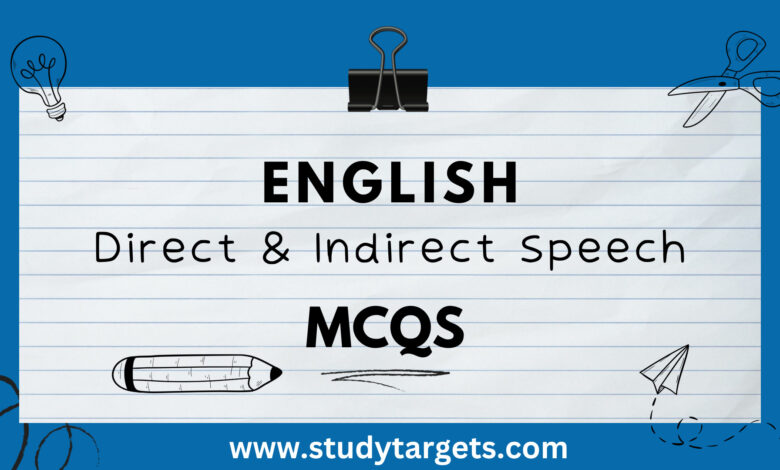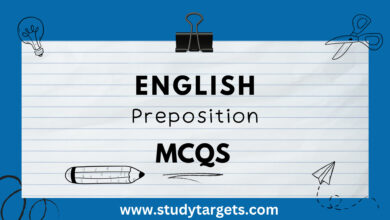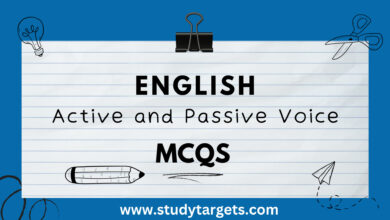Direct & Indirect Speech MCQs: English MCQs

1. Direct Speech is also known as:
a) Reported Speech
b) Indirect Speech
c) Quoted Speech
d) Converted Speech
Answer: c) Quoted Speech
2. What is the main purpose of using Indirect Speech?
a) To make the sentence shorter
b) To convey information accurately
c) To make the sentence more interesting
d) To highlight emotions
Answer: b) To convey information accurately
3. Which punctuation mark is used at the end of a sentence in Direct Speech?
a) Comma (,)
b) Period (.)
c) Question mark (?)
d) Exclamation mark (!)
Answer: d) Exclamation mark (!)
4. Choose the correct Indirect Speech for the following Direct Speech:
Direct: She said, “I am going to the mall.”
a) She said that she was going to the mall.
b) She said that she is going to the mall.
c) She says that she was going to the mall.
d) She said that she had gone to the mall.
Answer: a) She said that she was going to the mall.
5. In Indirect Speech, the reporting verb is usually in which tense?
a) Present tense
b) Past tense
c) Future tense
d) Present perfect tense
Answer: b) Past tense
6. Choose the correct form for the Indirect Speech of the following Direct Speech:
Direct: “Will you attend the meeting tomorrow?” he asked.
a) He asked if I will attend the meeting tomorrow.
b) He asked if I would attend the meeting tomorrow.
c) He asked if I am going to attend the meeting tomorrow.
d) He asked if I had attended the meeting tomorrow.
Answer: b) He asked if I would attend the meeting tomorrow.
7. Which pronoun changes to ‘she’ in Indirect Speech if the Direct Speech has ‘he’?
a) He
b) Him
c) His
d) Himself
Answer: c) His
8. Select the correct Indirect Speech for the following Direct Speech:
Direct: “I will visit my grandparents next week,” she said.
a) She said that she will visit her grandparents the following week.
b) She said that she would visit her grandparents the next week.
c) She said that she would visit her grandparents next week.
d) She said that she will visit her grandparents that week.
Answer: c) She said that she would visit her grandparents next week.
9. Which of the following is true regarding Indirect Speech?
a) It is always longer than Direct Speech.
b) It is always shorter than Direct Speech.
c) It is the same length as Direct Speech.
d) Its length can vary depending on the context.
Answer: d) Its length can vary depending on the context.
10. “Don’t touch that!” he said. This Direct Speech can be written as:
a) He warned not to touch that.
b) He told not to touch that.
c) He ordered not to touch that.
d) All of the above.
Answer: d) All of the above.
11. Which sentence uses the correct form of Indirect Speech?
a) John said that he is hungry.
b) Mary said, “I was studying last night.”
c) Peter said, “I will help you with your project.”
d) Sarah said that she has finished her work.
Answer: d) Sarah said that she has finished her work.
12. Choose the correct form for the Indirect Speech of the following Direct Speech:
Direct: “I cannot swim,” she said.
a) She said that she could swim.
b) She said that she can’t swim.
c) She said that she couldn’t swim.
d) She said that she can swim.
Answer: c) She said that she couldn’t swim.
14. Choose the correct Indirect Speech for the following Direct Speech:
Direct: “I am going to the cinema tonight,” he said.
a) He said that he will go to the cinema tonight.
b) He said that he was going to the cinema tonight.
c) He said that he is going to the cinema tonight.
d) He said that he would go to the cinema tonight.
Answer: d) He said that he would go to the cinema tonight.
15. Indirect Speech is often introduced by:
a) A comma (,)
b) A colon (:)
c) A question mark (?)
d) A reporting verb
Answer: d) A reporting verb
16. Choose the correct form for the Indirect Speech of the following Direct Speech:
Direct: “We have already booked the tickets,” they said.
a) They said that they had already booked the tickets.
b) They said that they have already booked the tickets.
c) They said that they will have already booked the tickets.
d) They said that they are booking the tickets.
Answer: a) They said that they had already booked the tickets.
17. Which sentence uses the correct form of Indirect Speech?
a) “I won the competition,” he said.
b) “I will visit my friend tomorrow,” she says.
c) “I have been working on this project,” they said.
d) “I had finished my homework,” she says.
Answer: a) “I won the competition,” he said.
18. In Indirect Speech, time expressions usually change to:
a) The past
b) The future
c) The present
d) The conditional
Answer: a) The past
19. Choose the correct form for the Indirect Speech of the following Direct Speech:
Direct: “I am writing a letter,” he said.
a) He said that he was writing a letter.
b) He said that he is writing a letter.
c) He said that he will write a letter.
d) He said that he had written a letter.
Answer: a) He said that he was writing a letter.
20. What is the correct Indirect Speech for the following Direct Speech:
Direct: “Who broke the vase?” she asked.
a) She asked who broke the vase.
b) She asked who has broken the vase.
c) She asked who will break the vase.
d) She asked who had broken the vase.
Answer: d) She asked who had broken the vase.
21. When changing Direct Speech to Indirect Speech, which pronoun changes to ‘they’?
a) He
b) She
c) We
d) I
Answer: c) We
23. Which tense is used in Indirect Speech to change “will” in Direct Speech?
a) Past tense
b) Present tense
c) Future tense
d) Conditional tense
Answer: d) Conditional tense
24. Select the correct Indirect Speech for the following Direct Speech:
Direct: “Where are you going?” she asked.
a) She asked where am I going.
b) She asked where was I going.
c) She asked where I am going.
d) She asked where I was going.
Answer: d) She asked where I was going.
25. Which of the following sentences uses the correct form of Indirect Speech?
a) “I am coming home late,” he said.
b) “I will see you tomorrow,” she said.
c) “I have finished my meal,” they said.
d) “I am reading a book,” she said.
Answer: c) “I have finished my meal,” they said.
26. Choose the correct form for the Indirect Speech of the following Direct Speech:
Direct: “I have already seen that movie,” he said.
a) He said that he has already seen that movie.
b) He said that he had already seen that movie.
c) He said that he will have already seen that movie.
d) He said that he is seeing that movie.
Answer: b) He said that he had already seen that movie.
27. Indirect Speech is often introduced by reporting verbs such as:
a) Jumped, shouted, laughed
b) Said, told, asked
c) Run, walk, sit
d) Ate, drank, slept
Answer: b) Said, told, asked
28. What is the correct Indirect Speech for the following Direct Speech:
Direct: “Can you help me with this assignment?” she asked.
a) She asked if she could help her with that assignment.
b) She asked if she can help her with that assignment.
c) She asked if she could help her with this assignment.
d) She asked if she can help her with this assignment.
Answer: c) She asked if she could help her with this assignment.
29. When the reporting verb is in the past tense, the verbs in Indirect Speech usually change to:
a) Past tense
b) Present tense
c) Future tense
d) Imperative tense
Answer: a) Past tense
30. Choose the correct form for the Indirect Speech of the following Direct Speech:
Direct: “I will call you later,” he said.
a) He said that he will call her later.
b) He said that he would call her later.
c) He said that he will call her soon.
d) He said that he will call her now.
Answer: b) He said that he would call her later.
31. Which word changes to ‘that’ in Indirect Speech if the Direct Speech has ‘this’?
a) Those
b) Here
c) These
d) Those
Answer: c) These
32. Select the correct Indirect Speech for the following Direct Speech:
Direct: “Why did you leave early?” he asked.
a) He asked why he left early.
b) He asked why did he leave early.
c) He asked why I left early.
d) He asked why had he left early.
Answer: c) He asked why I left early.
33. Choose the correct form for the Indirect Speech of the following Direct Speech:
Direct: “I won the competition,” she said.
a) She said that she won the competition.
b) She said that she had won the competition.
c) She said that she has won the competition.
d) She said that she will win the competition.
Answer: b) She said that she had won the competition.
34. When changing Direct Speech to Indirect Speech, which pronoun changes to ‘our’?
a) Your
b) My
c) Her
d) His
Answer: b) My
35. Choose the correct Indirect Speech for the following Direct Speech:
Direct: “I am working on a new project,” he said.
a) He said that he is working on a new project.
b) He said that he was working on a new project.
c) He said that he has been working on a new project.
d) He said that he had been working on a new project.
Answer: b) He said that he was working on a new project.
36. Which sentence uses the correct form of Indirect Speech?
a) “I can’t believe it,” she said.
b) “I’m going to the party,” he said.
c) “I have finished my homework,” they said.
d) “I will buy a new car,” she said.
Answer: c) “I have finished my homework,” they said.
37. What is the correct Indirect Speech for the following Direct Speech:
Direct: “Where is the nearest post office?” she asked.
a) She asked where is the nearest post office.
b) She asked where was the nearest post office.
c) She asked where the nearest post office is.
d) She asked where the nearest post office was.
Answer: d) She asked where the nearest post office was.
38. Choose the correct form for the Indirect Speech of the following Direct Speech:
Direct: “I love ice cream,” she said.
a) She said that she loves ice cream.
b) She said that she loved ice cream.
c) She said that she will love ice cream.
d) She said that she would love ice cream.
Answer: b) She said that she loved ice cream.
39. In Indirect Speech, the reporting verb may be followed by the word “if” when:
a) The reported statement is a question
b) The reported statement contains a modal verb
c) The reported statement contains a direct object
d) The reported statement is in the past tense
Answer: b) The reported statement contains a modal verb
40. Choose the correct Indirect Speech for the following Direct Speech:
Direct: “I have completed the assignment,” she said.
a) She said that she completed the assignment.
b) She said that she has completed the assignment.
c) She said that she had completed the assignment.
d) She said that she will complete the assignment.
Answer: c) She said that she had completed the assignment.
41. Which tense is used in Indirect Speech to change “am” in Direct Speech?
a) Past tense
b) Present tense
c) Future tense
d) Present continuous tense
Answer: b) Present tense




